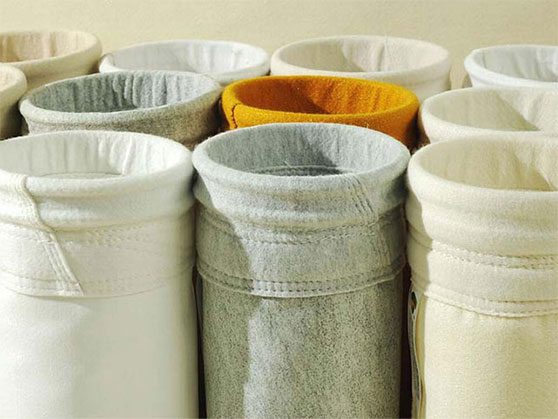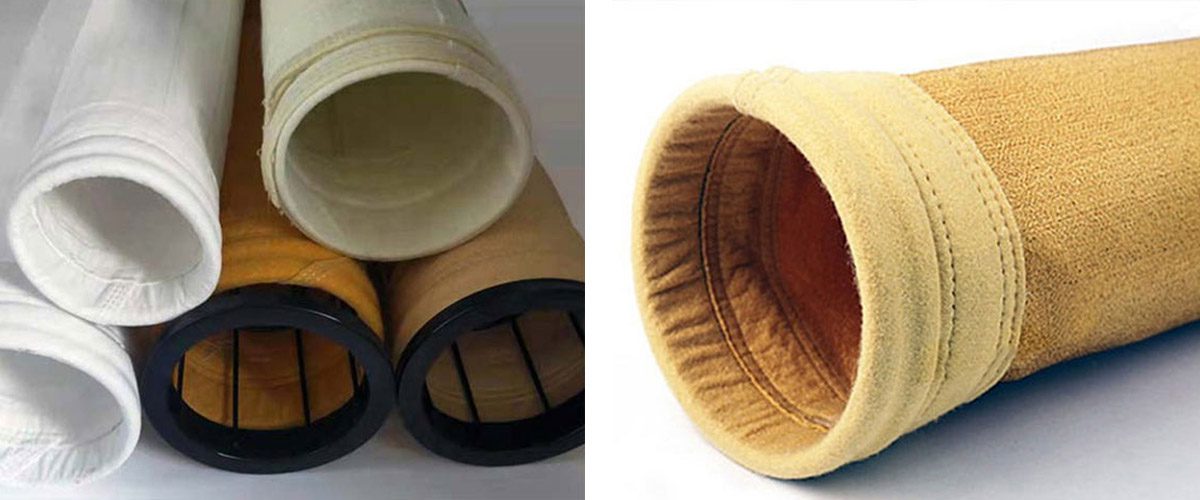How to choose a fillter bag
Dust collector filter bag is the “heart” of baghouse dust collector. Commonly known as dust filter bags, fabric bags, or dust collection bags, they serve the primary function of capturing solid particles from dust-laden gases. Consequently, this process improves air quality and ensures compliance with environmental regulations.
The structure and design of dust filter bags should focus on efficient filtration, easy cleaning, and durability. The selection of dust filter bags is crucial, as it directly affects the dust collection efficiency of the dust collector.
When selecting dust filter bags, it is crucial to consider several factors. These include operating temperature, chemical properties, and dust concentration. By taking these aspects into account, you can ensure that the chosen filter bag meets specific industrial dust removal needs.
| Material | PP | PE | DT | PPS | MX | Pl/P84 | PTFE | GL | |
| Temperature(℃) | Normal | 90 | 130 | 125 | 160 | 200 | 240 | ||
| Instant | 100 | 150 | 140 | 190 | 240 | 260 | |||
| Physical characteristics | tensile strength | excellent | good | excellent | excellent | excellent | average | excellent | excellent |
| antiwear | good | excellent | average | excellent | excellent | average | good | poor | |
| Chemical
characteristic |
Flexural Strength | good | good | average | excellent | excellent | average | excellent | poor |
| acid-resisting | excellent | average | good | excellent | average | good | excellent | poor | |
| alkali-resisting | excellent | average | average | excellent | average | poor | excellent | average | |
| hydrolysis resistance | excellent | poor | good | excellent | poor | poor | excellent | poor | |
| Oxidation resistance | good | excellent | average | poor | good | excellent | excellent | good | |
| Filtration performance | good | excellent | good | excellent | excellent | excellent | average | average | |
Where is the filter bag applied?
In industrial production, the application of dust filter bags primarily focuses on processes that generate large amounts of dust, smoke, odors, and other harmful gases and particulates. The Raxwell dust filter bag series is versatile and can be widely used in various industries. These include power generation, cement, waste incineration, steel, and non-ferrous metals. This series effectively meets specific dust removal needs across different sectors.
Power Industry
Flue Gas Characteristics:
Coal-fired boilers generate a significant amount of fine particulates during combustion, along with gaseous pollutants such as sulfur dioxide (SO2) and nitrogen oxides (NOx). The initial emission concentration of these pollutants is closely related to fuel quality, composition, boiler type, and load.
Filter Material Recommendation:
Based on coal quality and temperature, PPS or blended materials are recommended. Cleaning methods such as jet pulse, reverse air, and back blowing can be employed, with a suggested filtering wind speed of 0.6-1.0 m/min.
Cement Industry
Cement Mill Dust Removal
Flue Gas Characteristics:
Dust removal in cement mills includes raw material mills and clinker mills. Standard emission standards typically use PE550g conventional filter material treated for oil and water resistance. The dust concentration in imported flue gas is usually ≤300 g/m³.
Filter Material Recommendation:
For ultra-low emission modifications (≤10 mg/Nm³), PE ultra-fine blended top layer 550g filter material is recommended, treated for oil and water resistance; the suggested filtering wind speed is less than 0.75 m/min.
Coal Mill Dust Removal
Flue Gas Characteristics:
The temperature of coal mill exhaust is generally between 60°C and 80°C, with dust concentrations reaching 600-800 g/m³, and 40%-80% of the particulates having a diameter of less than 10 μm.
Filter Material Recommendation:
For ultra-low emission modifications (≤10 mg/Nm³), we recommend using PE ultra-fine blended top layer 550g filter material with a 550g coating. This material is treated to be anti-static, oil-resistant, and water-resistant. Additionally, we suggest keeping the filtering wind speed below 0.75 m/min.
Kiln Head and Kiln Tail Dust Removal
Flue Gas Characteristics:
The temperature range at the kiln head is typically 150°C to 200°C, with dust concentrations ≤30 g/Nm³. The kiln tail temperature is generally 200°C to 240°C, reducing to 150°C to 180°C after waste heat power generation, with dust concentrations ≤100 g/Nm³.
Filter Material Recommendation:
For kiln head dust removal, it is recommended to use MX550g filter material and PI+MX composite filter material. On the other hand, for kiln tail dust removal, the suggested materials include PI/TF550g filter material, PI+MX composite filter material, and fiberglass coated materials. Additionally, it is important to note that the filtering wind speed should be ≤0.75 m/min.
Waste Incineration Industry
Flue Gas Characteristics:
During waste incineration, flue gas typically has a high moisture content, generally ranging from 23% to 30%. Due to the complex composition of waste, the smoke generated has a complicated composition, particularly high concentrations of HCl and O2, and high salt content (chlorides and sulfates) in the dust. The particulates are fine and highly viscous.
Filter Material Recommendation:
It is recommended to use 100% PTFE coated materials, 100% PTFE, PTFE+P84 composite filter materials, and specially designed acid-resistant fiberglass coated filter materials.
By selecting Darko‘s dust collector filter bag, you will achieve superior filtration efficiency and enhanced air quality. For more information or technical inquiries, please feel free to contact us. We are happy to assist you.



